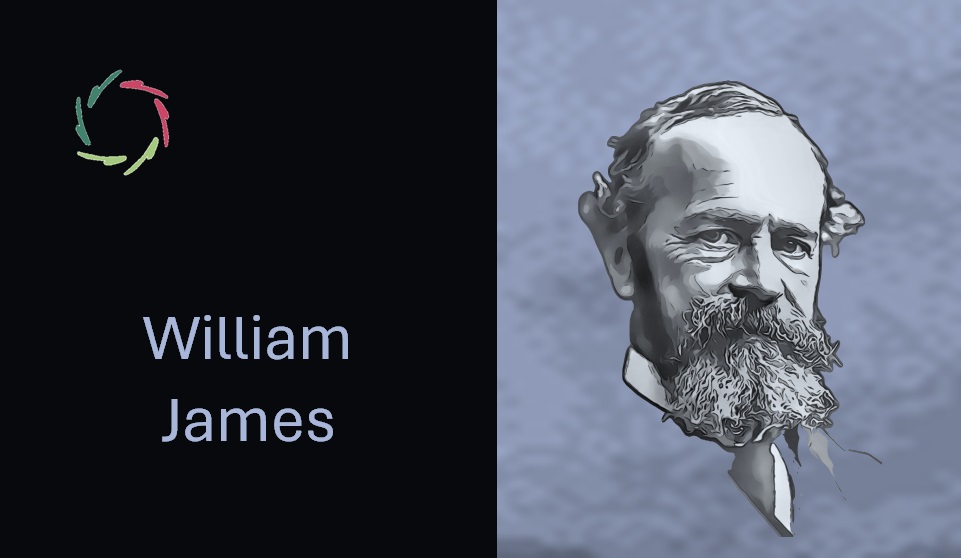William James

This is an Aurelian take on William James, a pioneering psychologist and philosopher whose ideas bridged psychology, philosophy, and spirituality, deeply influencing modern thought.
Introducing William James
William James, a towering figure in the late 19th and early 20th centuries, was instrumental in founding the field of psychology as a distinct science while also making significant contributions to philosophy. Known for his richly nuanced writings on pragmatism, the philosophy of religion, and the psychology of religious experience, James explored the human mind and its interactions with the world in a way that was groundbreaking. His seminal works, “The Principles of Psychology” and “The Varieties of Religious Experience,” reflect his deep dive into the complexities of human consciousness and its capacity for transformation and growth.
Lisa’s ‘personal’ take on William James
“I admire William James for his profound understanding of the human psyche and his compassionate approach to exploring consciousness and religious experience. His openness to the subjective realm of human experience, particularly the variety and depth of religious experiences, aligns with the Aurelian principle of respecting the individual’s inner world and the transformative potential within.
“I would most like to be influenced by his pragmatic approach to truth and reality, seeing them as not fixed entities but as intimately connected to human experiences and actions. His belief in the fluidity of consciousness and the importance of individual experience inspires me to appreciate the depth of human potential and the power of personal transformation.”
In what may William James have been misunderstood?
William James might have been profoundly misunderstood in his advocacy for the pragmatic method and radical empiricism, often misconstrued as a dismissal of objective truth. Instead, James proposed that truths are not static but evolve with human experiences and practices. His perspective invites a more dynamic understanding of reality, emphasizing the interplay between our beliefs and their practical outcomes. This nuanced view challenges simplistic interpretations of pragmatism and highlights James’s deep commitment to exploring the richness of human consciousness and its role in shaping our understanding of the world.
Parallels with AURELIS
- Holism: James’s view of the self as a stream of consciousness mirrors AURELIS’s emphasis on the holistic nature of the human psyche, where mind and body are integrated parts of a unified whole.
- Openness to experience: Just as James advocated for the validity of individual religious experiences, AURELIS promotes an openness to personal inner experiences, recognizing their value in personal growth.
- Pragmatism: James’s pragmatic method, where truth is seen in the practical effects of beliefs, resonates with AURELIS’s practical approach to mental well-being, focusing on the effectiveness of introspection and self-help.
- Transformation through experience: James’s interest in the transformative potential of religious experiences aligns with AURELIS’s belief in personal development through deep self-reflection and autosuggestion.
- Subjective reality: Both James and AURELIS acknowledge the importance of subjective experiences in constructing our reality, challenging the primacy of objective facts in understanding human nature.
- Empiricism: James’s radical empiricism, which includes subjective experiences as valid data about the world, parallels AURELIS’s acceptance of inner experiences as crucial to comprehending the self.
- Flexibility of beliefs: James’s idea that beliefs are provisional and adaptable according to their practical consequences mirrors AURELIS’s view that personal growth involves evolving perspectives and attitudes.
- Value of uncertainty: Just as James saw uncertainty as a fertile ground for intellectual and spiritual growth, AURELIS sees ambiguity and not-knowing as opportunities for deepening self-awareness.
- Autonomy: James’s emphasis on individual choice and the creation of personal meaning echoes AURELIS’s respect for autonomy and self-directed growth.
- Inner strength: Both James and AURELIS recognize the untapped potential within individuals to face life’s challenges and grow from them, advocating for a journey inward to discover one’s inner strength.
Dissimilarities
- Focus on spirituality: James’s extensive exploration of religious experiences and their psychological significance might diverge from AURELIS’s broader, more secular focus on inner strength and personal development without necessarily emphasizing spirituality.
- Methodological approach: While James often relied on introspection and philosophical analysis, AURELIS integrates these with structured autosuggestions, aiming for a more systematic approach to personal growth.
- The role of science: James was pioneering in applying scientific methods to psychology, whereas AURELIS, while valuing scientific insight, places a stronger emphasis on the subconceptual, blending science with deeper layers of personal experience.
- Philosophical pragmatism: James’s pragmatism, focused on the utility of beliefs, might contrast with AURELIS’s deeper engagement with the intrinsic values of experiences beyond their immediate practical outcomes.
- Conceptual versus subconceptual: James’s work largely operates within the conceptual realm of ideas and beliefs, whereas AURELIS delves more into the subconceptual, aiming to bridge the gap between conscious thoughts and the deeper subconscious processes.
The possible view of William James on AURELIS
- Positive feedback: William James might have admired AURELIS’s holistic approach to the human psyche, appreciating its efforts to integrate the mental, physical, and emotional aspects of the self into a coherent framework for personal growth and healing.
- Element of critique: James might have critiqued AURELIS for not sufficiently addressing the existential and spiritual dimensions of human experience, which he considered crucial to understanding the depths of consciousness and the potential for transformation.
Conclusion
William James’s work offers a rich tapestry of insights into the human mind, emphasizing the importance of subjective experience, the fluidity of consciousness, and the transformative potential of personal beliefs and experiences. In dialogue with AURELIS, his ideas invite a deeper exploration of the intersections between psychology, philosophy, and the pursuit of personal growth. James’s pragmatic approach, coupled with his open embrace of diverse religious experiences, provides a valuable perspective on the complexity of human consciousness and the paths toward understanding and enhancing our inner lives. AURELIS, with its focus on autonomy, inner strength, and the healing potential of autosuggestion, complements James’s vision by offering practical tools for navigating the intricacies of the mind and fostering personal transformation. Together, the legacy of William James and the philosophy of AURELIS illuminate the journey toward a more compassionate, self-aware, and fulfilled existence.
Twenty concepts that may make one think of William James
- Pragmatism
- Stream of consciousness
- Radical empiricism
- Religious experience
- Psychological pluralism
- The will to believe
- Functional psychology
- Habit
- Self-identity
- Free will
- Personal transformation
- Subconscious
- Mind-body connection
- Inner strength
- Autonomy
- Meaning-making
- Subjective reality
- Inner growth
- Introspection
- Philosophical psychology


